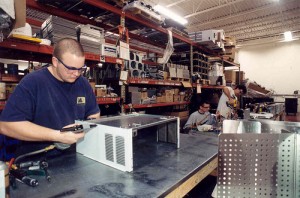 My blog reader is filled these days with articles about the need for reform in higher education. The value of the traditional four-year degree is highly debated and there is a call for new approaches to the education system. There are also a lot of posts about recent unemployment trends and the need to better prepare students with the skills required to enter the workforce.
My blog reader is filled these days with articles about the need for reform in higher education. The value of the traditional four-year degree is highly debated and there is a call for new approaches to the education system. There are also a lot of posts about recent unemployment trends and the need to better prepare students with the skills required to enter the workforce.
A 2010 study from Georgetown University's Center on Education and the Workforce [PDF], sought to provide a better "forecast of education supply and demand" than those already available, citing the need to "match education alternatives with career options." The study found that of the estimated 47 million job openings between 2008 and 2018, "63% of the total will require at least some college education." This includes one and two year certificate and degree programs.
Skill Gaps and Training Voids
The Washington Post reports evidence that in some employment sectors, such as manufacturing, it's not the jobs that are missing, "what's missing are the skilled workers needed to fill them." While there are multiple contributing factors to this problem, one of the potential causes is a change in the type of skills now required due to advances in factory automation and equipment.
Kevin Carey from EducationSector.org explains that "The more complicated the world gets, the more complex skills the job market requires." The example given was that of auto mechanics that in the 1970s typically would not have graduated from high school, but by the 2000s a third of those working in this field would have college degrees. Skills that were once mastered on-the-job or in apprentice-type learning environments may now require more formal curricula. Where can potential employees find the training they need to fill these positions?
While there may be a skills gap between what employers need and what job seekers have to offer, there is also the lack of training programs to consider. The availability of skills training is changing as well and has been in transition for decades. The Huffington Post draws attention to the fact that most of the programs that used to take place within a company's own training department have been eliminated, and many of the local education options are at capacity with more applicants than they can accept.
Lawrence Mishel from the Economic Policy Institute argues that "we need to prepare many students for jobs that don't require college degrees. … Our goals should be to expand access to the broad range of higher education and career training: as President Obama has said, 'community college or a four-year school; vocational training or an apprenticeship'."
Exploring Online Delivery
There are many avenues to becoming a skilled worker who is qualified to perform today's jobs. How could online learning help meet the demand? Online and blended formats are taking on larger roles in all types of learning situations as educational technologies expand the reach of instructors and students. Here are just a few of the examples already underway:
- The National Association of State Directors of Career Technical Education Consortium is working to "create an educational environment that integrates core academics with real-world relevance." The Employability and Career Development System includes online components such as assessments, lesson plans, multimedia resources, and electronic portfolios, as part of a standards-based curriculum.
- Partnerships between employers and higher education institutions are on the rise, as well as plans for degree offerings based on the employment needs in a local area. The University of South Carolina System, for example, is planning new aerospace programs "directly related to job prospects in the state," which include new Boeing plants. Louisiana Technical College works with employers through its online Ed2Go initiative to "train new employees, update employee skills, and provide advancement opportunities." And while predominately state-funded, new programs in North Carolina's community colleges are preparing students for work with local employers such as Caterpillar, Honda Aircraft, and Siemens.
- Cisco Systems, Inc. is just one example of large-scale training and certification programs that incorporate online and face-to-face delivery. The Cisco Learning Network features a host of web-based materials, study groups, webinars, and discussion boards, as well as blogs and social media networking options.
Many challenges lie ahead for decision-makers at all levels of education and employment. Prospective students and job seekers may benefit from some of the new approaches to online learning bringing additional career opportunities within reach. Employers and educators may also benefit from exploring new models for the development of a skilled workforce.
Image credit: Saginaw Future, Flickr, CC-BY